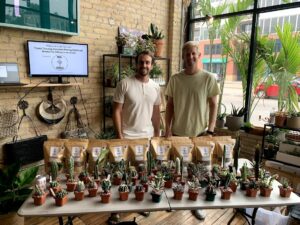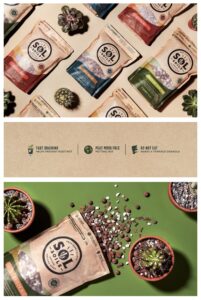News & Stories
The sweet smell of soil success

It’s cactus day for Travis Thein (MBA ’16) and it’s more than just a hobby.
This is research.
“I’ve got about 80 to 100 cacti in this room and all over this place,” Thein says while panning his laptop’s camera around the living room. “Right now, it’s watering day.”
Mondays through Fridays, he leads digital fulfillment strategy and innovation efforts at Target, a job he loves. And on weekends, he turns his full attention to plants and soil.
Thein co-founded Sol Soils, a Minneapolis-based startup offering premium potting mixes for cacti, succulents, bonsai and other popular indoor and outdoor house plants, in 2020. He met company co-founder John Porter while hanging out at the pool in his girlfriend’s condo complex and the two bonded over a shared interest in plants and soil.
Soon he found himself painstakingly experimenting to find just the right combination of ingredients that would become Sol Soil’s gritty and chunky mixes.

Travis Thein (MBA ’16, left) and Sol Soils business partner John Porter during a repotting class at the company’s first retail client, the Greenery Mpls.
He landed a retail partner within a month of launching. Within six months, Sol Soils could be found in the two top garden centers in Minneapolis. He now ships palettes of its soil to Ohio locations of Petitti, one of the top garden center chains in the U.S. and has his sights on the shelves of Home Depot and Lowe’s.
The company hit an estimated $1 million in revenue in 2023. Thein wants Soil Soils to be worth $3 million soon and $50 million within five to 10 years.
Thein has no background in entomology or horticulture. He doesn’t have experience in soil science — or any science. Neither does Porter. Thein had never owned a houseplant until recently. Growing up, all of the plants in his house were artificial.
What Thein has are an unexpected knack for sales, a product that fills a gap within the more-popular-than-ever houseplant market, a strong interest in environmental sustainability, and an MBA from UNC Kenan-Flagler Business School.
“I think I knew we had something special when I went to a retailer for the first time and they said, ‘First of all, sell this for more. Second of all, we’re definitely interested,’” says Thein. “It’s been interesting to see the passion that comes from customers because, you know, it’s dirt. But really, it’s not just dirt.”
Sol Soils is making waves at just the right time. The COVID-19 pandemic ignited a renewed — and, so far, sustained — interest in houseplants, succulents and gardening for those looking for a more pleasant home environment and a stress-relieving hobby to pass the time while stuck indoors.
Succulents and houseplants saw the greatest growth in sales among garden center products in 2021, when there was a 65% increase in sales to Millennials, according to Garden Center Magazine. Premium potting soil isn’t a new product, but Sol Soils’ carefully crafted, distinctive mixes are.
“People often think they don’t have a green thumb with indoor plants or that they can’t keep succulents alive, but it’s not their fault,” says Thein. “Usually, it’s because they bought it with terrible soil that is really cheap. They buy a plant that’s going to die for sure unless they do something drastically different.”

Thein spent over 1,000 hours researching, designing and testing different mixes for Sol Soils’ retail and direct-to-consumer line.
That’s a big part of why Sol Soils works. It was born out of Thein’s love of houseplants and a practical need for more environmentally friendly soil. Before Sol Soils, he was an amateur gardener excited about replacing his lawn turf with native wildflowers and tired of buying plants that died in a few days.
There’s no peat moss in Sol Soils’ products since it releases damaging carbon into the atmosphere when harvested. The gritty, hand-mixed ingredients used by Sol Soils are designed to minimize the need for watering while maximizing its effectiveness.
The mixes lower the risk of root rot, often to blame when potted plants die quickly. The innovative nature of Sol Soils helped it win the 2023 Cool New Product Award at the Tropical Plant International Expo, with voters including houseplant market leaders and established garden centers.
Thein has always been interested in environmental issues and sustainability, but they remained in the background of his life and career goals. Instead, he focused on finance as an undergraduate at the University of Kansas and worked as a specialist for American Century Investments after graduation.
While he concentrated on corporate finance again when he entered the Full-Time MBA Program as a Vetter Dean’s Fellow, he picked UNC Kenan-Flagler because he wanted to foster his interest in sustainability.
The School is now home to the Ackerman Center for Excellence in Sustainability, which offers a sustainable enterprise concentration for MBA students. Thein served as executive vice president of the MBA Energy Club and a member of the Net Impact Club. As a Vetter Dean’s Fellow, he worked with faculty and staff to develop more robust opportunities for MBA students to focus on environmental sustainability.
While he began working at Target right after earning his MBA, he never suppressed his passion for sustainability that reignited at Carolina.
“Coming to UNC Kenan-Flagler for my MBA was the best choice I’ve ever made in my career,” says Thein. “What some call ‘soft skills’ classes, the ones that focused on groups and teams and navigating bureaucracy, were the ones that have been most impactful for my long-term career growth.”
Now, with Target’s understanding and blessing, Thein is planning to turn his side hustle into a full-time venture.
“This was not a path I expected for myself, but when you go to a top MBA program like UNC Kenan-Flagler you open yourself up to completely different career opportunities and get the support you need,” says Thein. “I might not have the same background as people who do well with this type of business, but I know having a business background is what has made us so successful so quickly.”